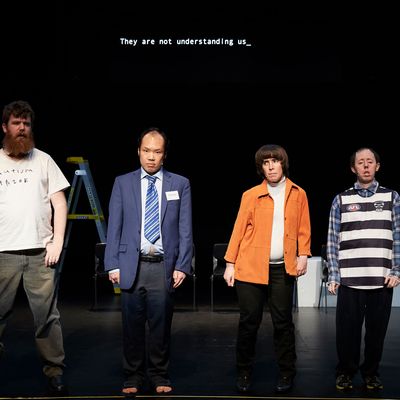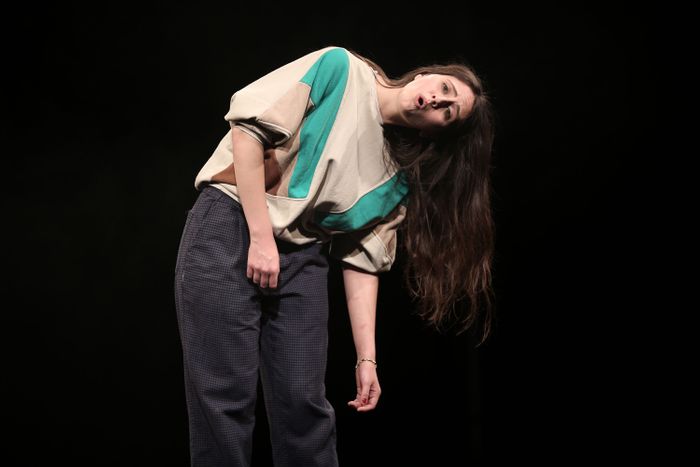
Over the past 14 years, there has been a lot of January festival coverage — and it always goes the same way. January, blissed-out theater lovers say, is New York’s time to refill her artistic tank. Thanks to a welter of simultaneous festivals — many of which take advantage of international connections to diversify their lineup — the public gets a massive, cheap, easy-to-find infusion of adventurous performance. And yes! Ever since Mark Russell started Under the Radar in 2005 and kicked off a scene that still includes the Exponential Festival and Prototype and Ferus, this has been the right time to ring in something theatrically new. You can count on getting dazzled by the future of the form at least twice a week.
Well, oops. This year, I inadvertently scheduled a first festival week in which I seemed to only be looking backward. I tried to gobble up as much as I could in the Under the Radar at the Public Theater (a single location and midday performances are key for Volume Theatergoing), but there I mainly saw things that felt familiar. In a season full of new things, I had somehow stumbled into shows full of fear of what’s coming, formal retrenchment, even … retreat.
Often, an artist was simply interested in examining his or her past. In the loveliest show of this type, Ahamefule J. Oluo’s Susan — a tribute to his mother — returned to the formula that worked so well for him in Now I’m Fine. He’s composed some blowout big-band songs, which his band punches into your chest one brass flourish at a time, wandering up to the microphone for anecdotes between numbers. The recipe still works beautifully: The music ravishes and overwhelms you, but his gently pointed reminiscences (co-written by his wife, the author Lindy West) give you time to recover. That’s the same function the shaping of the stories seems to have served in his own life — a way to contain and master terrifying emotions.
Sometimes a piece would make a claim on the futuristic, like, say Laurie Anderson and Hsin-Chien Huang’s piece To the Moon. This swift 15-minute show is experienced through a virtual-reality headset. Once strapped in, we see the world fall away all around us, and we seem to sail swiftly upward to the moon over our heads. There we can soar around the lunar seas — VR is wonderful at flying — sometimes gliding over dinosaurs made out of fluffy light particles or dodging hailstorms made out of garbage from Earth. Our bodies change: Our arms become long spider legs, then the astronaut body we’ve been inhabiting falls off a mountain. Anderson’s voice muses about her love for stars — we can’t hurt them or flood them or destroy their climates — and then we’re done.
Based on Anderson’s meditative tone and music, we’re meant to be floating into the transcendent here. But the show seems to actually forestall dreaming: The VR and its images (dinosaurs to make us think of extinction, trash to make us think of trash) overwhelms our imaginations by being everywhere, in all directions. The moon is more evocative, strangely, in Amir Nizar Zuabi’s shaky comedy Grey Rock, a Palestinian production, produced by a U.S.-based company and performed (ill-advisedly) in English. A widower (Khalifa Natour) in a small village near Ramallah decides to build a rocket to the moon as a combined retirement project –slash–rebellion in the face of Israeli crackdowns. His daughter thinks he’s crazy; her fiancé thinks she’s crazy. Comedy ensues. The play itself fits uncomfortably on the Public’s large Martinson stage, playing both broadly and hesitantly, and the story could do completely without the stock romantic plot twists. But Zuabi isn’t just writing a comedy, he’s pointing out the overlap between the rocket project and the actual event we’re watching. The moon is a wild dream; the production’s tour is almost as unlikely. Why does it take a heroic effort to simply move one group of people from one country to another? Why are borders less escapable than gravity?
Many of the shows contain this sense of education and “getting the message out.” Andares, by the Makuyeika Colectivo Teatral, for instance, blends storytelling and music to talk about indigenous experiences in Mexico. The three performers and accompanying singer tell their own tales, touching on dream quests, vanishing Mayan language, state-sanctioned theft of family land, and violence against the Zapotec’s genderfluid muxes. All the performers feel exiled in some way, and they’ve come a long way to explain the sensation.
The best piece I’ve seen in the festival so far — The Shadow Whose Prey the Hunter Becomes — has this instructive quality, too. Australia’s Back to Back Theatre worked with a company of intellectually disabled actors to devise a beautifully scripted piece: We seem to be watching a community meeting, in which four neuro-diverse performers discuss public and private behavior (where to masturbate, etc.) as well as the value of artificial intelligence. Finely structured and performed, The Shadow moves gradually into pointed critique and then into warning. AI is already with us, the four caution, and soon the world will be run by intelligences that far exceed what we can imagine. Have we made a world in which intellectual difference is treated carefully, respectfully, humanely? “They’re still not getting it,” one of our lecturers mutters to his fellows. Our understanding moves more slowly than theirs.
My one journey outside of Under the Radar this week was to Queens Row, a sere hour-long piece by Richard Maxwell at the Kitchen. Three monologues, delivered coolly, tell the story of an American broken apart by a coming civil war. All our narrators are women, and their monologues grow increasingly strange and inhuman. By the end, the theater itself seems to be speaking, and smoke drifts weirdly around a woman like a hand coiling across her shoulder. Maxwell’s long career on the stage has been an experiment in lightness. As a director, he keeps trying to subtract seemingly vital organs — like a set (here it’s only Sascha van Riel’s choreographed fog and someone flashing the lights) or sense (one speaker glitches like a badly programmed bot) or pretense. In Queens Row, he seems to be using that theatrical starvation to make us think about how weak we feel when we think about the future. It sounds like it will be terrible, doesn’t it? But we just stand there like statues on a plinth, letting smoke from those coming fires wreathe itself around us.
The Under the Radar festival is at the Public Theater through January 19.
Queens Row is at the Kitchen through January 25.



